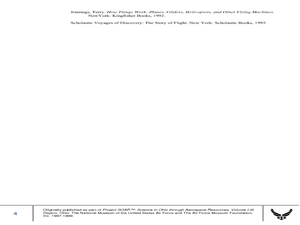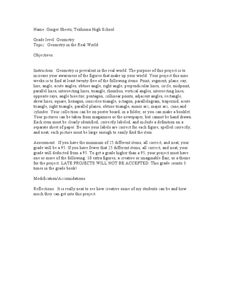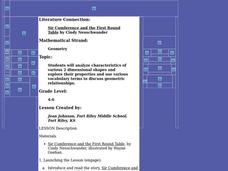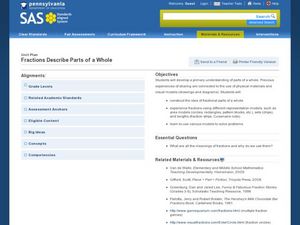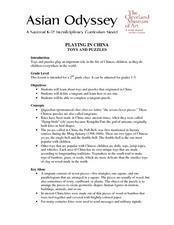Curated OER
Parachutes: Is it Surface Area or Shape?
Students investigate how to make a good parachute. In this physics lesson, students observe the motion of parachutes as it falls and measure the time. They collect data and calculate the average descent time for each canopy shape.
Curated OER
Measurement Investigations 1
Fifth graders find perimeters, areas, and volumes of everyday objects and state the precision. They work in small groups in order to take measurements, perform calculations, and write a group report about the investigation.
Curated OER
The Chicken Run
Fourth graders work in a group of 4 to make rectangle with a 12m length of string. They discuss its perimeter and how they would calculate its area. Then another group of 4 make another rectangle and estimate if the area would be greater...
Curated OER
Super Shapes Part 2 - Circles
Through the use of Internet, video, and hands-on activities, youngsters learn the parts and characteristics of a circle. This fantastic lesson has some excellent website activities included in the plan. Your kids will have a much greater...
Pennsylvania Department of Education
A Geometric Scavenger Hunt
Fifth graders connect their knowledge of polygons and polyhedrons. In this geometric shapes instructional activity, 5th graders identify and classify two- and three-dimensional objects. Students construct a polyhedron out of polygons and...
Curated OER
Orbital path of Landsat
Students comprehend how Landsat satellites orbit teh Earth to produce images. They comprehend the elliptical path of satellites. Students recognize that a different orbital path is needed for different satellites to perform their tasks....
Curated OER
Geometry Review Quiz
Young scholars conduct a review that is done right before having a geometry quiz. They cover major topics that are part of the assessment. They use review cards as notes to pass to one another to reinforce the concepts before putting...
Curated OER
Which container holds a larger amount of popcorn?
What does popcorn have to do with math? Seventh grade mathematicians are provided an opportunity to develop a conceptual understanding of the formula for volume and to use it as a tool to solve problems. The lesson begins with a...
Curated OER
ExplorA-Pond:3rd Grade Shapes & Fractions
Students, using a map, drawing or aerial view of a pond, represent the shape of the pond using simple geometric shapes or fractions of those shapes. They identify the numerator and denominator in each fraction created.
Curated OER
Introducing Powers and Models
Young scholars construct two dimensional models to illustrate squared numbers. For this geometry lesson, students use graph paper and an x/y axis to build squares exponentially. Young scholars identify powers and relationships between...
Curated OER
Geometry in the Real World
Eighth graders complete a unit of lessons on basic geometry concepts. They participate in a variety of activities, culminating in a project that involves publishing a booklet or a poster that presents the major geometry concepts from the...
Curated OER
"Sir Cumference and the First Round Table" by Cindy Neuschwander
Young scholars analyze characteristics of various 2 dimensional shapes and explore their properties and use various vocabulary terms to discuss geometric relationships.
Curated OER
You Can Count on Squares!
Fourth graders engage in and explore to develop mathematical, specifically algebraic, ideas. Although the tasks are built around measurement, they are algebraic to the extent that they require 'formulae' to be derived form the geometric...
Curated OER
Black Bayou Lake Measures Up
Students, in groups, estimate measurments and then select the tools needed and measure various items at Black Bayou Lake refuge.
Curated OER
An Introduction to Quadrilaterals
Students explore different types of quadrilaterals. Students define the terminology used with quadrilaterals. They create particular quadrilaterals based on specific characteristics of the quadrilaterals using an online tool.
Curated OER
Translations, Reflections, and Rotations
Students are introduced to the concepts of translation, reflection, and rotation. They practice translating, reflecting, and rotating two-dimensional objects on the coordinate plane. students use computers to learn about the three concepts.
Curated OER
Fractions Describe Parts of a Whole
Third graders represent fractions as part of a whole. In this fractions lesson, 3rd graders use manipulatives to show how a fraction is a part of a whole. This lesson includes individual practice and an assessment instead of direct...
Curated OER
Peter's String
Students are introduced to the math problem and consider how they could approach it. In pairs, students investigate Peter's conjecture in any way they see fit. They then share their answers with the class.
Curated OER
Playing in China
Learners create their own Chinese tangrams using in-class direction and prior knowledge in this two-day instructional activity for the early elementary classroom. Chinese toys are also explored.
Homeschool Math
Homeschool Math: Area of Triangles
This lesson presents the idea that the area of any triangle is exactly half of a certain parallelogram -- thus we get the familiar formula of multiplying the base and the altitude and taking half of that. The lesson contains varied...
Better Lesson
Better Lesson: Finding the Area Review and Assessment
Sixth graders find the area of rectangles, triangles, parallelograms, and trapezoids by using formulas or by composing into rectangles or triangles.
Better Lesson
Better Lesson: Area of Composite Shapes
Sixth graders take their knowledge about area of rectangles, squares and triangles and apply it to parallelograms, trapezoids, and composite shapes.
Homeschool Math
Homeschool Math: Area of Parallelograms
This lesson presents the idea that the area of any right triangle is exactly half of a certain rectangle, and contains varied exercises for young scholars.
